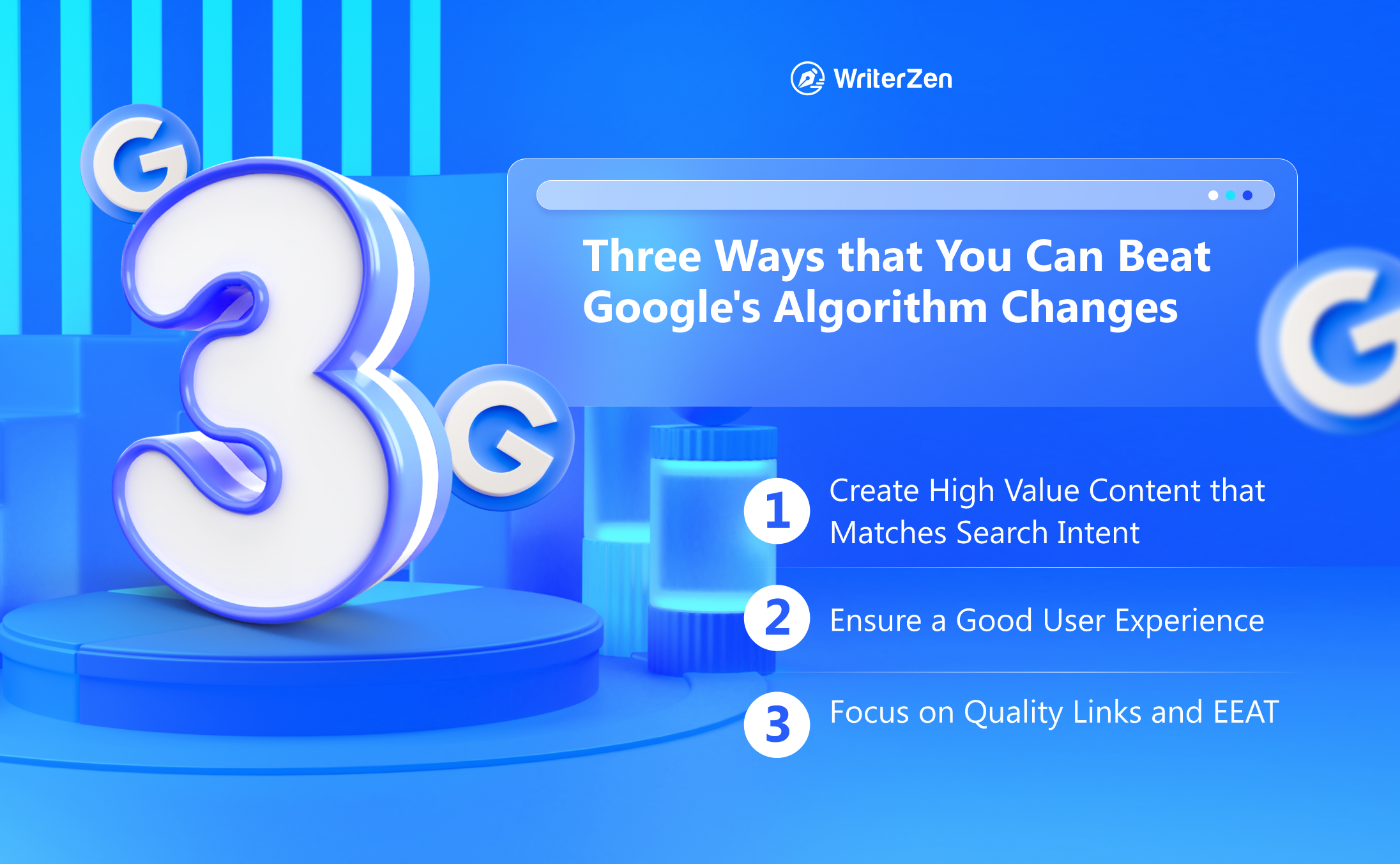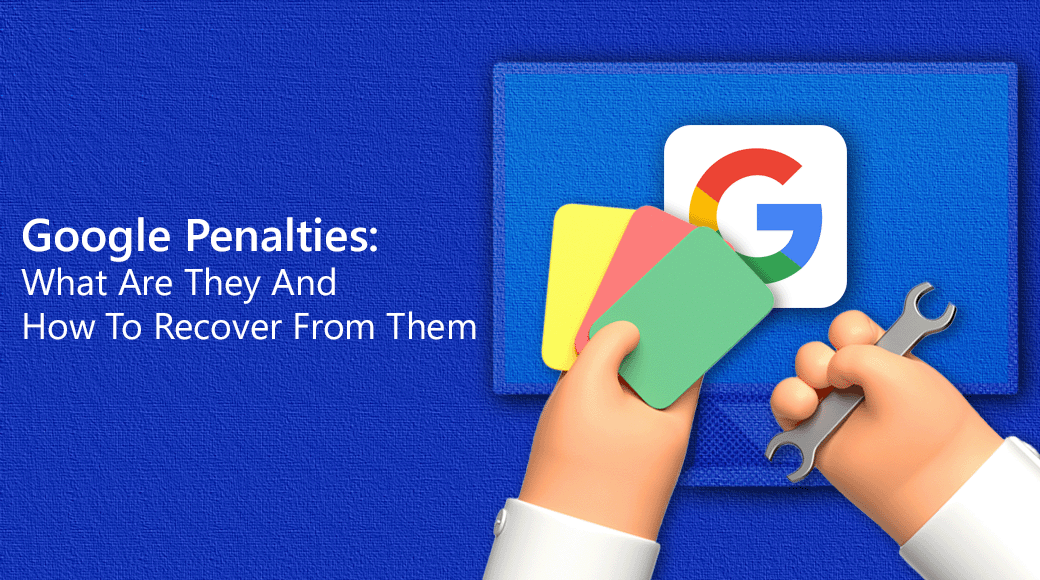Imagine this: You have been working on a skyscraper construction project that required months of careful planning, structural designing, developing construction techniques, back-breaking physical and creative work.
Everything was executed just as planned, but one day you felt an intense shaking. Without any warning… the labor of your blood, sweat, and tears crashed through the ground right before your eyes. Feels miserable, right?
Most SEOs panic and feel a similar intense pain when their site experiences a 65%-80% dip in traffic right as soon as Google rolls out a core update.
Google releasing algorithm updates on a regular basis is no news. Some of them are tiny, like user interface updates that almost every site can survive. But it’s hard to stay unaffected after an intense shaking of Google’s core updates.
We hear you thinking: how do I protect all my hard work from crumbling and keep up with Google updates? Well, worry not.
This article covers everything you need to know to make your site algorithm resistant and help you stay on your toes when Google's curveballs are coming for you. Before we dive right into the tactical solution, let’s go back to the basics.
The Concept of Google’s Core Updates and Reasons Behind Releasing New Ones
In an interview with Search Engine Journal, John Mueller, Google’s search advocate recommended studying core algorithm updates to be able to better diagnose the reason behind sites losing their search visibility following a core update.
“So I think there are a few things here that come together. I would recommend checking out the blog post that we did about Google search engine updates. It has a lot of information about core updates, especially about the kinds of issues that we look into there and how things are resolved over time,” John notes.
That is enough reason to get you more curious about…
What Is a Core Algorithm Update?
A core algorithm update brings significant changes to the search results. Google’s core updates are strong enough to have a profound impact on websites across industries and platforms.
The primary purpose of core updates is to uphold Google’s mission of providing valuable and relatable search results for users. The impact on your website can be both positive and negative.
Imagine waking up to the news that all your favorite grocery stores, malls, and restaurants had moved to a different city overnight. You'd be pretty frustrated, right?
Well, that's what can happen to websites after a core update. All of a sudden the rules of the game changes, and websites that were once on top may find themselves plummeting in the search rankings, while others soar to new heights.
This can be scary as well as rewarding for many. Google releases core updates two to three times per year, hence following Google’s guideline and keeping your finger on the pulse of the Google search engine updates is vital.
Why Does Google Roll out New Algorithm Changes?
From Desktop Page Experience to February 2023 Product Review Update, If you look at the history of Google’s algorithm updates, you will find one fundamental reason behind all the changes — providing an enhanced search experience to users.
In the beginning, Google would keep bad actors from abusing and manipulating the algorithm by releasing updates like Penguin that targeted spammy link practices.
Although Google continues to roll out updates to combat spam, it has recently shifted its focus towards prioritizing the display of top-quality content on the search engine results page (SERP). That’s because Google aims at keeping users extremely satisfied.
And Google will continue to update its algorithm to decide what the SERP shows and improve the results. Updates are designed to make search results better and more helpful to people by making them more accurate and relevant.
Through the years of algorithm updates, Google has altered its approach to various aspects, including understanding human language, search intent, providing search results with additional features, localized results, similar search suggestions, and evaluating the quality of content on webpages, and so on. Learn how search updates work and are helping your business.
How Google Algorithm Updates Affect Your SEO
The updates will be detrimental to websites with a weak foundation and no strategy. These websites may experience fluctuations in their rankings due to Google's core update.
For example, web pages that previously had high rankings for specific keywords may now rank lower, impacting the overall ranking of the website in search results, which can lead to revenue loss.
Google's reassessment of website pages is the main reason behind the decline in rankings of several websites. There is a suspicion that AI-generated content may have been more severely impacted in the latest update, although Google has not confirmed this.
For companies with a strong site structure and strategy in place, however, the changes should be relatively uneventful. According to Ben Goodey, founder of The Fxck, “after a core update, a temporary dip follows and then a continued upward trajectory.”
“But if you aren’t doing anything too spammy, producing lots of content that doesn’t add value to the reader, and are following other best practices around speed/website performance, only reviewing products you’ve actually used, then you shouldn’t get unexpectedly hit by the changes in the algorithm. If you have, there must be an underlying cause,” continued Ben.
In most cases, Google's webmaster guideline violations are to blame for algorithmic actions causing changes to websites. While these updates don't target any specific website or page, it is important to understand how to minimize any negative impact to protect.
How You Can Beat Google's Algorithm Changes
Panicking and changing strategy as soon as the news of core algorithm update breaks out aren’t the best way to face the challenge head on. We asked five SEO experts to share their top tips on becoming algorithm resistant.
Their advice boiled down to three core areas that you can put more focus on. This will ensure you aren’t penalized for avoidable reasons when Google's algorithm updates roll out.
Incorporating these tips can enhance your search engine rankings stability in the long run and help you develop an SEO strategy that is more resistant to Google algorithm updates.

Create High Value Content that Matches Search Intent
To prevent a decline in your website's ranking, it's essential to create high-quality content that caters to your intended audience and relevant keywords. Additionally, it's important to exercise caution when modifying your website, as it could potentially have adverse effects.
As Myriam Jessier from PRAGM notes, “Focus on what truly matters at the end of the day. There's this Cher quote: "If it doesn't matter in five years, it doesn't matter". Useful content that helps humans be informed and make decisions, that matters. Crawlable websites, that matters. Websites that are enjoyable, that matters. Once you know this, each update makes sense to you, because it's Google's way of getting closer and closer to what matters to them as a search engine.”
“If you're focused on creating content that your audience loves and improving the overall site experience, you're less likely to worry about algorithm updates. Yes, core updates can significantly affect your rankings and traffic temporarily. But in the long run, every algorithm update helps to reward sites with helpful content, quality links, and excellent content experience.” suggested SK Rafiqul Islam, founder of Content Marketing VIP.
Ensure a Good User Experience
Google's core updates can have a significant impact on a website's search engine rankings and traffic. One way to mitigate any negative effects of these updates is by providing a good user experience on the website. Here are some reasons why a good user experience is important in withstanding Google's core update.
Jessica Peck, machine learning engineer at Local Google Guide said, “Google wants to "make people happy" with their results, and that means your web page should quickly solve your user's problem. Match your pages to query intent: cover a lot of angles in a way that's easy to navigate.
Websites that offer a good user experience tend to have better user engagement metrics such as lower bounce rates, longer time on site, and more page views per session. These metrics signal to Google that the website is providing value to its users, which can help it maintain its search rankings during a core update.
A high bounce rate can signal to Google that the website is not providing users with the information they are looking for. This can lead to a drop in search engine rankings. By providing a good user experience, websites can reduce their bounce rates and signal to Google that their content is valuable and relevant.
Websites that offer a good user experience tend to build trust with their users. This can lead to increased brand loyalty, more social shares, and better online reviews, which can all help to improve a website's search engine rankings.
Algorithm updates often aim at improving outcomes for the searcher. If you focus there, on creating a customer-centric SEO strategy that doesn’t try to hack the algorithm, then you’ll likely be unaffected when a new update rolls out.
Focus on Quality Links and EEAT
Google takes into account a variety of factors when ranking websites, and it's reassuring to know that even if a site has spammy content or links, Google will still recognize and reward other positive attributes.
Marco Giordano, a Web Analyst at Sika, emphasizes more on building a solid backlink profile. He said, “building an actual brand is usually the best method to future-proof your assets.”
Your content should always aim to be helpful. If the reader lands on your site, your goal is to serve their needs—otherwise, Google isn’t going to want to show you to new readers. But Google has lots of ways to understand if your content serves needs. So keep making sure your site performance is strong, you show authority signals, and your content gets to the point.
According to Google's John Mueller, their algorithms are designed to identify and disregard any dubious activity related to links, so that they can concentrate on analyzing the site's more positive aspects, including relevant and credible content.
As Mueller stated, Google strives to take a comprehensive approach to search, in order to gain a deeper understanding of a site's value.
While the precise qualities that can outweigh spammy links and SEO are not fully known, it's possible that a site's level of EEAT (Experience, Expertise, Authority, and Trustworthiness) may play a significant role.
By following the outlined tips, you can construct a website of superior quality that can endure modifications to Google's algorithm.
Final Thoughts
Google's algorithm update is a complex thing with many moving parts. You can't be expected to know every minute detail and be always ready when the algorithm changes strike back. It's easy to get bogged down by all the advice out there concerning Google's new algorithm updates.
But if you follow good SEO practices, create high-quality content, keep the focus on satisfying users, have a strong site structure, and follow a solid SEO strategy — it doesn't matter how often Google changes its algorithm. You will be able to get to work quickly, adhering to the updates as needed.















